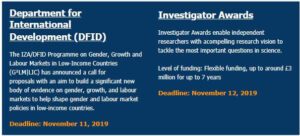TEACHING: The Past, Present and Future
On World Teachers’ Day (2019), UNESCO has adopted the theme: “Young Teachers: The Future of the Profession.”
The day provides the occasion to celebrate the teaching profession worldwide, to take stock of achievements and to address some of the issues central for attracting and keeping the brightest minds and young talents in the profession.
According to a new UNESCO Institute for Statistics’ paper, several developing countries are struggling to recruit, retain and train enough teachers to keep up with a large and growing school population. The paper further states that globally, about 263 million children and youths are out of school, including 25 million children of primary-school age. Meanwhile, in developing countries, just about 14% of youths complete upper secondary education; a disheartening percentage.
Teaching, according to some professors, is a conscious behavior that makes learning more probable and efficient such that teachers become and remain architects of all professions. It is estimated that to achieve the goal of universal primary education by 2020, countries will need to recruit a total of 24.4 million primary teachers and 44.4 million secondary teachers over the next 12 years, an important step towards quality education and sustainable society.
Education, a fundamental human right which is indispensable for the achievement of sustainable development requires quality teachers. Quality teachers who per time can transform their students to scientists, doctors, engineers and several noble professions regardless of relatively low income.
The noble profession combined with their qualities should not be ignored nor undermined for they are essential to the achievement of professionalism and sustainable development. Teachers are known to shape the minds of youths, making significant differences in their communities such that lives become more impacted even at limited speed.
While teaching is a special occupation, few do it effectively, playing pivotal roles in the school of transformation. While many are most incompetent, poor teaching of some peculiar subjects have shattered the hopes of many students who could not comprehend the tutorials, hence the need for educated young minds.
The ‘Born Teachers’ insistence on perfection has shaped many lives tremendously, acknowledging their pupils’ needs and addressing them albeit their challenges. Their compelling guidance to obey parents, respect elders, leaders, and to fear God, are golden teachings forever treasured, coupled with the established fact that teachers should show exemplary leadership skills in the upbringing of every child which also emphasizes on another fact that teachers either make or mar the end product of the noble profession.
They play pivotal parental roles and continue to do so even in the lives of their pupils. Taking care of one or two children is never an easy task in homes, let alone a teacher to about 30 pupils or more. It is recognized that teachers are not only a means to implementing educational goals, they also are keys to sustainability and national capacity in achieving learning and creating societies based on knowledge, values and ethics. They however continue to face challenges of poor training, low income and staff shortage.
Added to the challenge of numbers is one quality all too often, teachers are found working without resources or proper training. According to the UNESCO Institute for Statistics, the quality of education in many countries is undermined by a deficit of teachers. About 1.4 million teachers are missing in classrooms which are needed to achieve Universal Primary Education, the fourth goal being quality education.
For the future of this noble profession, researches reveal that teacher shortages in sub-Saharan Africa is the highest worldwide, it reveals a growing need of about 17 million teachers to achieve universal primary and secondary education by 2030. According to Teachers Registration Council Of Nigeria, Nigeria has just about two million qualified and registered teachers, with recorded statistics that the country will always be in need of 250,000 teachers annually to cater to the growing population of pupils.
While it is noted that some government owned schools can only boast of very few qualified teachers. Statistics reveal that West Africa has a growing need of about 7 million school teachers; unfortunately, Nigeria carries a massive chunk of that number. This is because the country has the largest out of school children, thus the urgent need of large number of qualified teachers.
Global Thematic Consultation on Education states several essentials for supporting teachers’ effectiveness which include: good conditions of employment, appropriate contracts and salaries, prospects for career progression and promotion; good conditions in the work environment, creating school contexts that are conducive for teaching and quality training for teachers.
At this juncture, action calls for international communities, governments and individuals to unite to produce and support teachers who can qualitatively teach and motivate students, especially in countries where the highest numbers of out-of-school children exist, while capacity building is also needful for the enhancement and sustainability of the quality of teachers in line with global best practices of Sustainable Development Goals (SDGs).
Teachers have proven to be pupils’ angels and of all very challenging professions, one of the hardest is being a good teacher. Safe to write that if students have not learned then the teachers have not in any way taught, therefore for optimum teaching to take place there is need for teachers to be well trained, equipped and very well paid.




